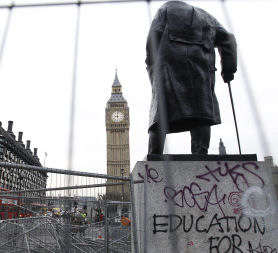Tuition fees vote reveals Tory strains
Yesterday’s tuition fee vote produced the predicted Lib Dem divisions – but it also shone a new light on splits in the Conservative Party, says Gaby Hinsliff.

The heir to the throne’s car splattered with paint, Oxford Street smashed, fires burning in front of Parliament.
The drama of the tuition fee riot eclipses that of the fee vote in today’s papers, suggesting a wider Establishment at bay.
Perhaps that’s partly because what happened inside was so well-trailed. About half (28 out of 57) of Nick Clegg’s MPs voted with the Government, as he predicted. No senior Lib Dem left government in the end, although three ministerial aides (two Lib Dem and the Tory Lee Scott) quit.
After a confused and scrappy week, Clegg is tarnished but soldiers on to the next crisis (welfare reform? control orders? Trident?). The surprises came from elsewhere in the chamber.
Tory rebels
The Tories suffered a small but interesting revolt: three of those involved – Andrew Percy and Jason McCartney who voted against, and Tracey Crouch who abstained – were new MPs, who traditionally keep their heads down. While the two men have rebelled before, Crouch is an ex-Shadow Cabinet aide who hasn’t previously stepped out of line.
It seems the new Tories are genuinely bringing new perspectives to their party, in ways not always convenient to its leader.
Like Scott, these three represent constituencies where £9,000 sounds like a lot of money. Percy is a teacher, a veteran of tough state schools; Crouch a social worker’s daughter who spends her spare time coaching youth football: McCartney an ex-RAF officer turned sports presenter. Scott left school at 15 and got his degree at night school.
David Cameron‘s attempt to recruit more diverse candidates like these has been dismissed as window dressing. But it seems the new Tories are genuinely bringing new perspectives to their party, in ways not always convenient to its leader. If they have one thing in common with the Tory right – more worried about looking soft on crime, tax cuts and Europe than student finance – it’s that they risk making Cameron’s rather gilded circle look out of touch with ordinary voters.
The U-turns executed recently over school sports, pensions and sentencing reforms suggest Cameron now understands that risk. But it still feels this morning as if neither leader has a commanding grip on their party, a precarious position for coalition partners whose success depends on bringing their MPs with them on difficult issues.
Perhaps that’s what Nick Clegg really meant by ‘walking through fire’ together.
Gaby Hinsliff is a former Political Editor of The Observer newspaper




